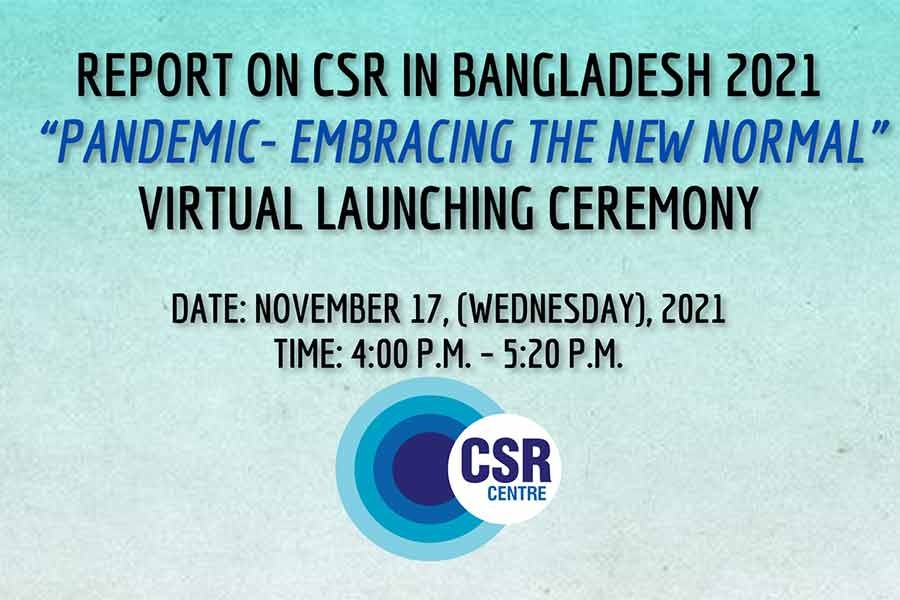
Published :
Updated :

The CSR Centre formally launched its annual CSR Report titled “Report on CSR in Bangladesh 2021: Pandemic - Embracing the New Normal '' on November 17 2021.
Chairman, CSR Centre Board of Trustees, Mr Farooq Sobhan moderated the panel discussion, highlighting the period of the pandemic in Bangladesh, and its effect on the overall global community.
He said: “We thought it, therefore, appropriate that our ninth CSR annual report be devoted to the pandemic and how we in Bangladesh have been coping with the pandemic.”
Through its CSR Report, the Centre disseminates how corporates are engaged in CSR programs/projects in Bangladesh. CSR paves the way towards sustainable business and greater returns on investments.
CSR Report 2021 highlights the initiatives businesses have taken amidst the pandemic as they continue to promote corporate sustainability. It emphasises partnerships to create resilient communities.
Esteemed Panelists included South Korean Ambassador Lee Jang-Keun, Japanese Ambassador ITO Naoki, President, American Chamber of Commerce (AmCham) Sayed Ershad Ahmed, Deputy Office Director, Economic Growth Team, USAID Bangladesh, US Embassy Muhammad N Khan, CEO, CSR Centre, Shahamin S. Zaman and Ministry of Foreign Affairs, Government of the People’s Republic of Bangladesh Ambassador Mashfee Binte Shams, Secretary (East).
The event also featured a video message from Dr A K Abdul Momen, Foreign Minister, Bangladesh.
He explained the importance of CSR within the country, stating that it not only fulfils the needs of citizens but also stimulates competition and growth in the country, allowing it to create a better offering overall.
He said: “In Bangladesh, we aspire to have a responsible and accountable CSR mechanism, rather than one peripherally engaging consumer ignorance for advertising the products of brands in the guise of social responsibility.”
As the first speaker of the panel discussion, South Korean Ambassador to Bangladesh Lee Jang-Keun emphasised the RMG sector in Bangladesh, praising their determination throughout the pandemic with CSR activities.
He said: “Many Korean companies in Bangladesh focused their CSR activities on human resources development — training, on the workforce, and by supporting students at schools.”
“And I learned that it is largely owed to the vigilance and prudence of the operators… The factories were run under strict protective measures, including checking of body temperatures every two or three hours, and the presence of doctors on site,” he added, noting the low number of coronavirus cases, particularly in the RMG sector.
He also highlighted the CSR activities of the Samsung Electronics branch office and Hyundai Engineering and Construction in Bangladesh.
Following Mr Lee Jang-Keun, Japanese Ambassador to Bangladesh ITO Naoki discussed CSR activities conducted by Japanese companies across the world amidst the pandemic.
He expressed the importance of community and the “no one left behind” concept he believes the JICA has been following in order to encourage development in Bangladesh.
He said: “I hope that the Japanese companies will also be able to actively participate in CSR in Bangladesh and try to focus on this very concept.”
Sayed Ershad Ahmed, president of the American Chamber of Commerce (AmCham) discussed the effects of COVID-19 on the education sector in Bangladesh.
Encouraging skill development in the country, he said, “Under this circumstance, improving human capital by investing in education, skill development, health and some other related fields is a key issue for Bangladesh.”
He also made a point of the rehabilitation efforts that are a large part of CSR activities in Bangladesh, focusing on cyclone shelters built in Sirajganj.
Muhammad N Khan, deputy office director of the Economic Growth Team at USAID Bangladesh discussed the exemplary work of USAID in Bangladesh, adding that USAID will be focusing their efforts on the private sector in Bangladesh under the new development cooperation strategy.
“We have seen how some of these opportunities have led to private sector companies becoming more involved in investing in communities, introducing new innovations, and helping people adapt to a rapidly changing world,” he said.
Concluding the panel discussion, Ambassador Mashfee Binte Shams, Secretary (East) at the Ministry of Foreign Affairs, discussed the government's efforts in ensuring welfare for workers in society.
She reiterated the importance of community and all around support, adding that together the organisations and communities in the country can create sustainable growth for Bangladesh.
“A well-coordinated and fruitful private public-private partnership is crucial to achieving the vision of Bangladesh as it was dreamed by our Father of the Nation,” she concluded.
Representatives from the corporate sector, government, development partners, academia & media participated in the event.


 For all latest news, follow The Financial Express Google News channel.
For all latest news, follow The Financial Express Google News channel.